Introduction
In the pursuit of a healthier lifestyle, the journey to reducing belly fat often stumbles upon a common misconception: the belief that targeted exercises, like sit-ups, can effectively eliminate fat in specific areas. However, this article delves into the reality of fat loss, emphasizing the importance of a holistic approach that combines exercise and nutrition.
By integrating:
- cardiovascular workouts
- strength training
- a balanced diet
individuals can create a sustainable path toward achieving their fitness goals.
Moreover, the significance of consistency and the psychological aspects of motivation play crucial roles in this transformation. With the right tools and support, such as:
- personalized coaching
- community encouragement
anyone can embark on a successful journey to better health. This exploration not only aims to debunk myths but also empowers HR Benefits Managers to foster a culture of well-being within their teams, ultimately inspiring lasting change.
The Myth of Spot Reduction: Can Sit-Ups Really Target Belly Fat?
A prevalent myth in fitness communities is the belief that sit-ups are good for losing belly fat. While strengthening the abdominal muscles is a benefit of sit-ups, research consistently shows that sit-ups are not good for losing belly fat. While fat reduction happens across the body due to a caloric deficit, many still ask if sit-ups are good for losing belly fat instead of relying on targeted activities.
To truly achieve a slimmer waistline, individuals must embrace a diversified approach that includes both cardiovascular activities and strength training. Our wellness coaching app supports this holistic strategy by offering:
- Personalized workout plans
- Nutrition guidance
- Daily programming
This ensures your team stays on track with their health goals. The convenience of having all these resources in one place eliminates the hassle of searching for different wellness programs.
Additionally, features like video demonstrations help visual learners comprehend activities better, while movement flows keep users engaged and active. As fitness professionals often emphasize, although it is a common question whether sit-ups are good for losing belly fat, focusing solely on them can detract from more effective methods for achieving fitness goals. With features like direct messaging for personalized coaching and community support, the app empowers users to cultivate a sustainable and effective fitness routine.
Remember, it’s not just about the number of sit-ups; it’s about taking a comprehensive approach to health and well-being, fueling lasting change for your team.
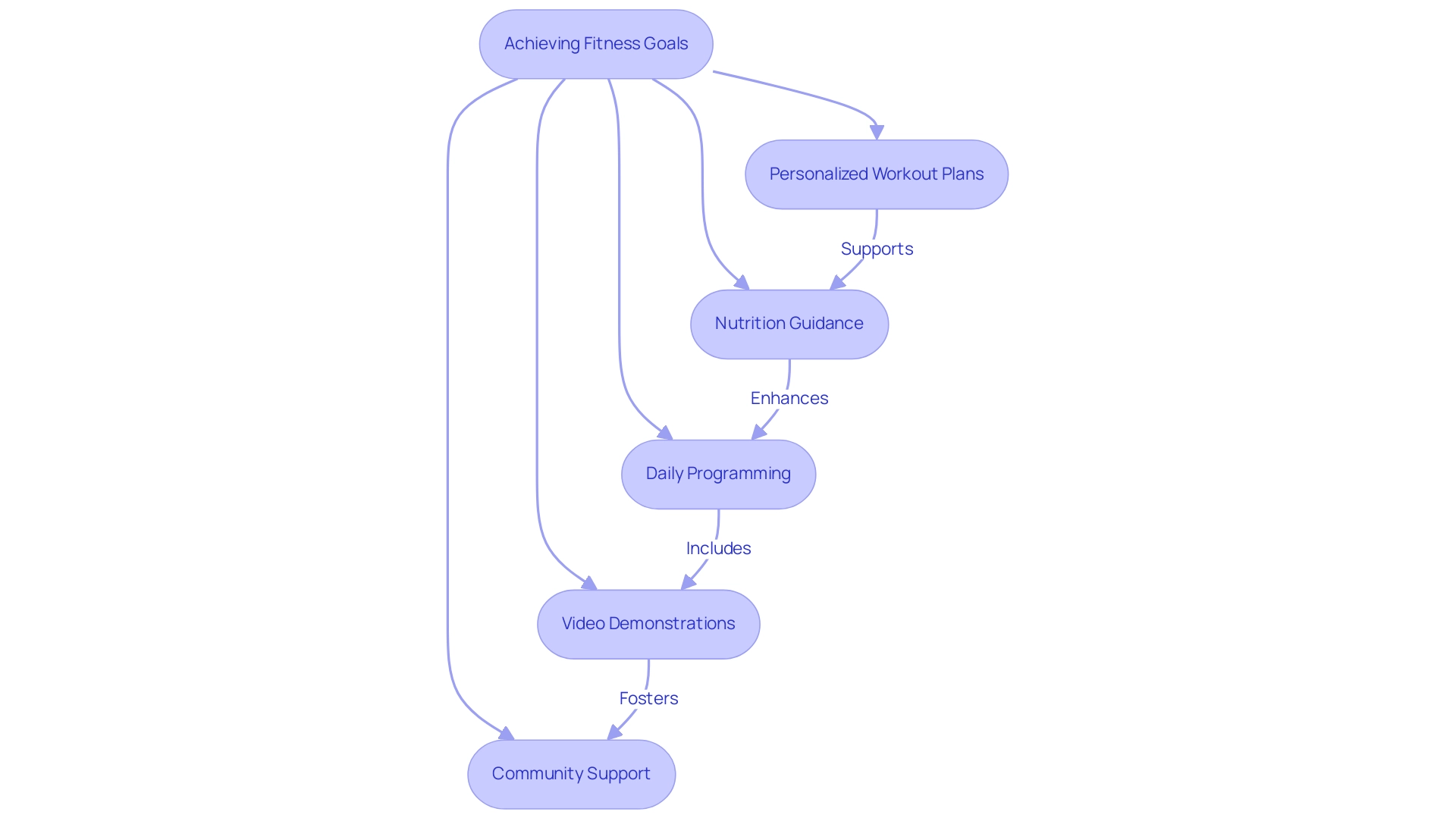
Combining Exercise and Nutrition: A Comprehensive Approach to Belly Fat Loss
Achieving effective belly fat reduction requires a comprehensive approach that seamlessly integrates both physical activity and nutrition, which is central to the tailored programs offered by Foresight Health Coaching. Regular participation in aerobic exercises—like running, cycling, or swimming—plays a crucial role in burning calories and supporting weight reduction. Notably, a study revealed that participants in a 600 kcal aerobic group saw a significant increase in aerobic capacity, showcasing the effectiveness of such activities.
However, it's important to note that most studies indicate exercise alone plays a small role in weight reduction, with recommendations suggesting up to 60 minutes of daily exercise may be necessary when relying solely on exercise. When paired with strength training routines, like sit-ups, many wonder if sit-ups are good for losing belly fat, as this combination not only enhances muscle tone but also contributes to overall fitness levels. Equally important is the role of nutrition; a balanced diet abundant in whole foods, lean proteins, healthy fats, and a variety of fruits and vegetables is essential for creating the caloric deficit necessary for fat loss.
Furthermore, minimizing sugar intake and processed foods can significantly bolster efforts in weight management. An updated systematic review illustrated how various aerobic exercise regimens can influence blood pressure management and overall cardiovascular health, further emphasizing the broader benefits of aerobic activities. By embracing this multifaceted strategy, individuals are more likely to achieve sustainable and meaningful results in their journey to lose belly fat.
Remember, if you’re trying to lose weight, consider incorporating resistance training to preserve muscle and increase calories burned at rest, as well as high-intensity interval training (HIIT) for time-efficient workouts. Foresight Health Coaching also provides corporate memberships that include in-person wellness talks, comprehensive pantry services, and access to our health and wellness app, all designed to enhance employee motivation and well-being. By integrating these vital elements into daily routines, HR Benefits Managers can inspire their teams to prioritize their well-being and embark on a successful path to health with the support of tailored health coaching services.
We invite you to connect with us to learn more about how our programs can benefit your organization.
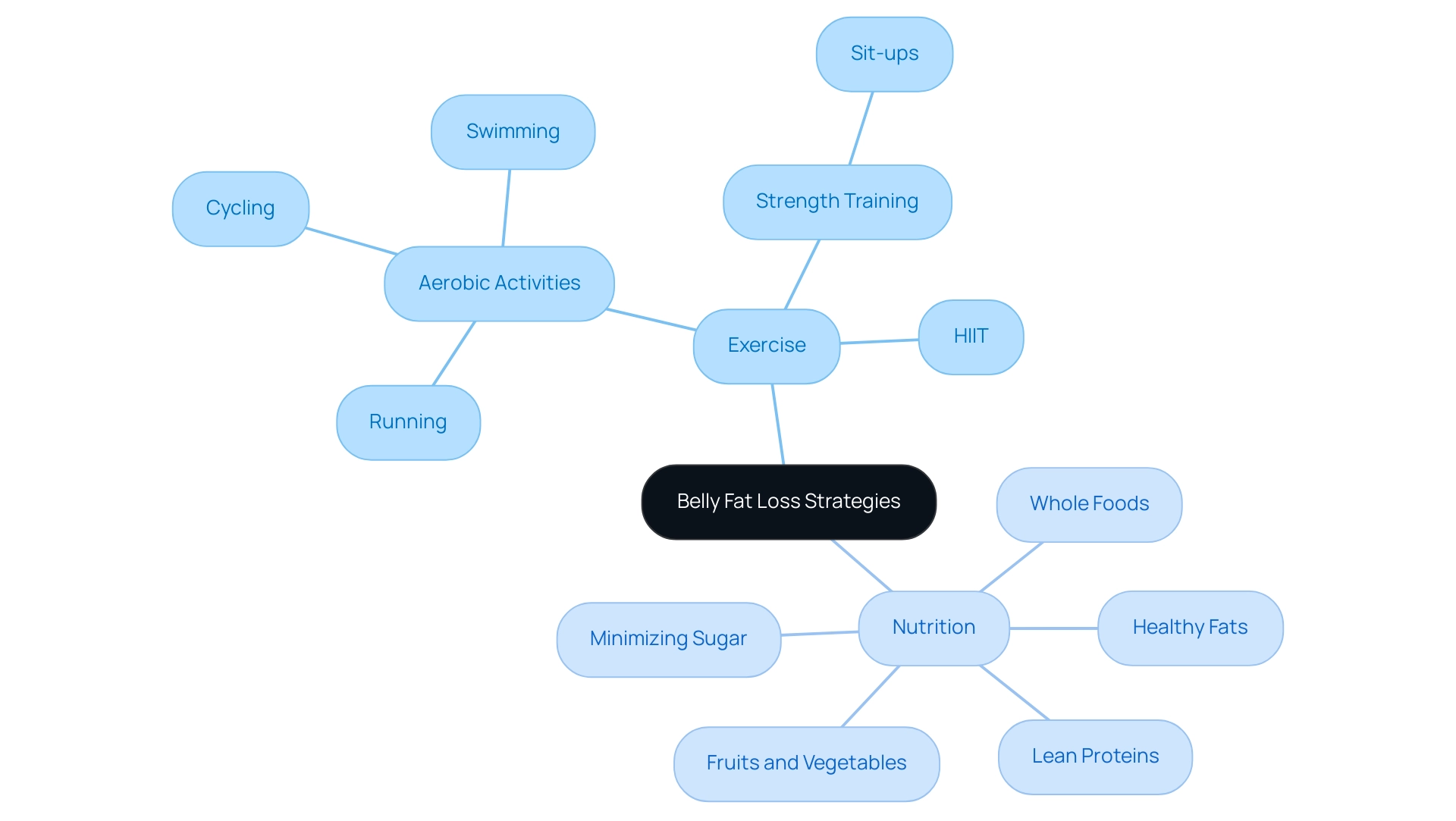
The Role of Consistency in Achieving Fat Loss Goals
Consistency serves as a fundamental pillar in the pursuit of effective fat reduction. Research indicates that individuals who adhere to a regular exercise regimen and embrace healthy eating habits are significantly more likely to achieve their goals. In fact, nearly 1 million data points show what it takes to lose fat, get healthy, and change your body, reinforcing the critical role of consistency.
As Dr. John Morton, head of bariatric and minimally invasive surgery at Stanford Health Care, insightfully notes,
Weight reduction doesn’t occur in a straight line,
highlighting the need for patience and realistic expectations. Establishing attainable fat reduction objectives is essential, as significant changes in body composition demand time and commitment. With personalized coaching and experienced guidance, individuals can receive tailored support that makes a difference in their journey.
For instance, one client shared,
'With the personalized coaching I received, I was able to lose 20 pounds and maintain my weight reduction by following a structured plan that fit my lifestyle.'
Progress tracking—whether through measurements, photos, or fitness milestones—serves as a powerful motivator, allowing individuals to witness their journey firsthand. Furthermore, establishing a routine that aligns with one's lifestyle enhances the likelihood of long-term adherence.
The National Weight Control Registry highlights that a staggering 94% of successful individuals incorporated physical activity in their weight reduction strategies; however, only 1% attained results through physical activity alone, emphasizing the necessity of dietary restraint alongside fitness. Additionally, recent data shows that the proportion of exercises meeting the 150-min/week recommendation was:
- 88.5% for early-morning
- 82.5% for late-morning
- 82.8% for afternoon
- 85.9% for evening exercises
illustrating the varied exercise habits among individuals. Our coaches employ evidence-based techniques, such as cognitive behavioral strategies and motivational interviewing, to empower clients in making lasting changes.
By prioritizing consistency and leveraging personalized coaching, individuals can cultivate enduring habits that not only facilitate fat reduction but also contribute to improved overall well-being. Let's discuss how we can help you thrive in the modern world while learning from the wisdom of the past. Contact us today!
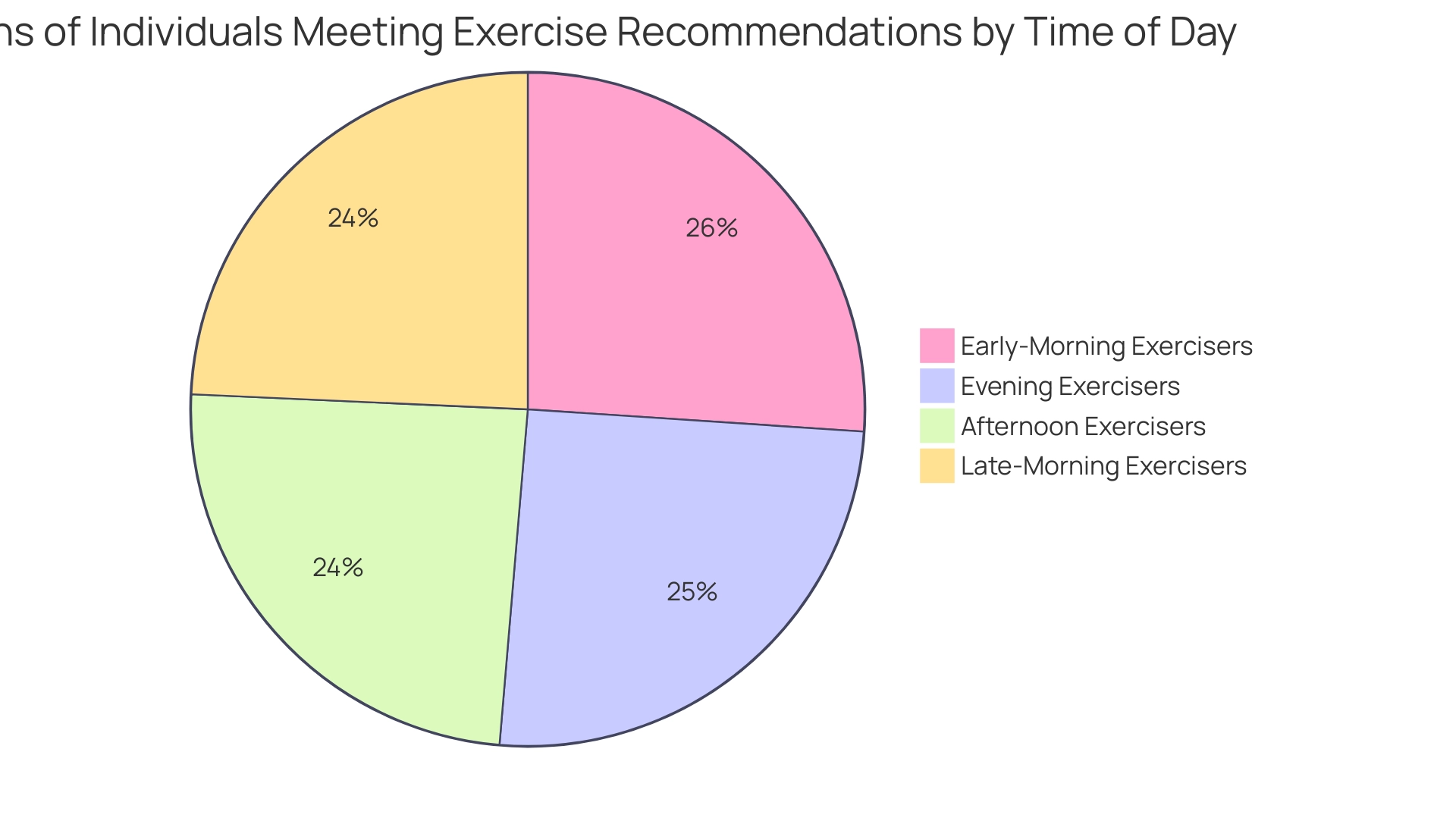
Incorporating Strength Training for Overall Health
Incorporating strength exercises into a fitness regimen is not just beneficial; it's essential for promoting optimal health and effective fat loss. While cardiovascular exercises are excellent for immediate calorie expenditure, strength workouts play a pivotal role in developing muscle mass, which significantly boosts resting metabolic rate. Research indicates that with a waist circumference reduction of -1.66 cm from combined aerobic and resistance exercises, the benefits are clear.
The greater muscle mass a person possesses, the more calories they expend even when at rest, making strength exercises a powerful tool for weight management. Furthermore, resistance exercises have been shown to enhance metabolic function and improve body composition by reducing subcutaneous abdominal fat, as noted in recent systematic reviews. According to research, resistance exercise has many neuroprotective effects, such as an increased expression of brain-derived neurotrophic factor (BDNF), which underscores the broader health benefits of this exercise modality.
Furthermore, a case study titled 'Resistance Exercise Affects Metabolism and Blood Pressure' indicates that weight lifting can enhance brachial artery endothelial function, which is important for cardiovascular health. Enhanced endothelial function from resistance exercise contributes to better blood pressure regulation and overall cardiovascular health. Incorporating exercises like squats, deadlifts, and core workouts not only contributes to a well-rounded fitness routine but also empowers individuals to enhance their physical capabilities.
By prioritizing strength training, one can effectively aid in reducing fat, leading to improved health, vitality, and overall well-being.
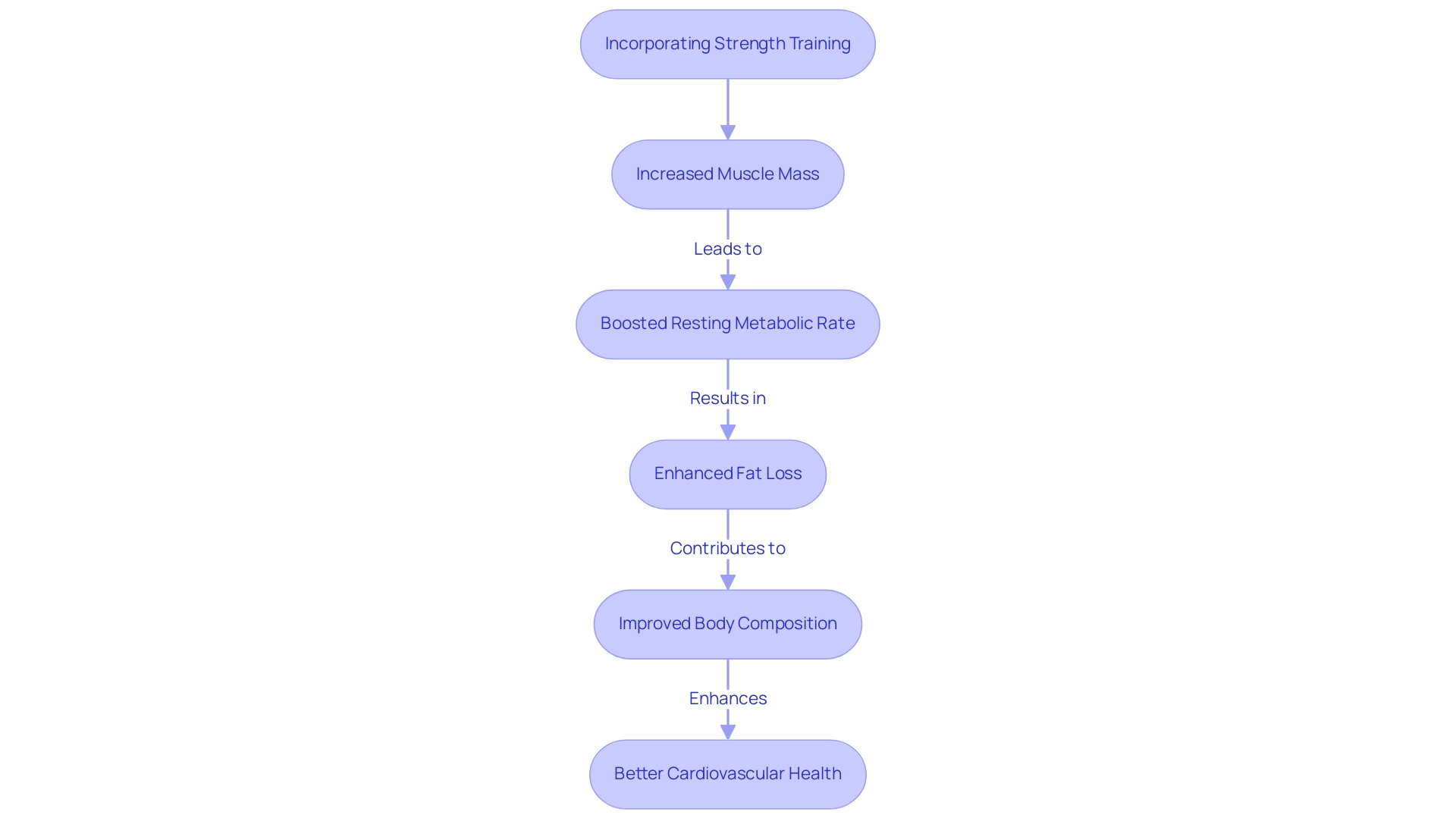
The Psychological Aspect of Fat Loss: Motivation and Mindset
Embarking on the journey to reduce belly fat transcends mere physical effort; it is deeply intertwined with psychological factors that can significantly influence outcomes. Fluctuations in motivation are common, and individuals often encounter challenges that test their resolve. This is where personalized coaching comes into play, providing tailored support and experienced guidance essential for lasting lifestyle changes.
As one client stated, 'The personalized coaching helped me stay accountable and motivated throughout my weight reduction journey.' Cultivating a positive mindset is paramount for overcoming these obstacles and maintaining focus on wellness goals. Effective strategies such as visualization, where individuals picture their desired outcomes, and setting short-term milestones can serve as powerful motivators.
Celebrating small victories along the way reinforces progress and builds momentum, while engaging with supportive communities—both in-person and online—provides essential encouragement and accountability, creating a network for shared experiences. Recent studies highlight that employees who engage in regular exercise not only report enhanced motivation at work but also experience better emotional well-being, which can translate into greater workplace productivity. For instance, a study discovered that participants attained a maximum weight reduction of 6.2% at six months and maintained an overall decrease of 3.5% after two years.
By nurturing a resilient mental approach to reducing fat, individuals can confidently navigate the inevitable ups and downs of their journey. This underscores the impact of a strong psychological framework on long-term success; as seen in weight loss programs where motivation and mindset, supported by personalized health and wellness coaching, are critical elements in achieving these outcomes. For HR Benefits Managers, prioritizing these strategies can lead to empowered well-being for their teams.
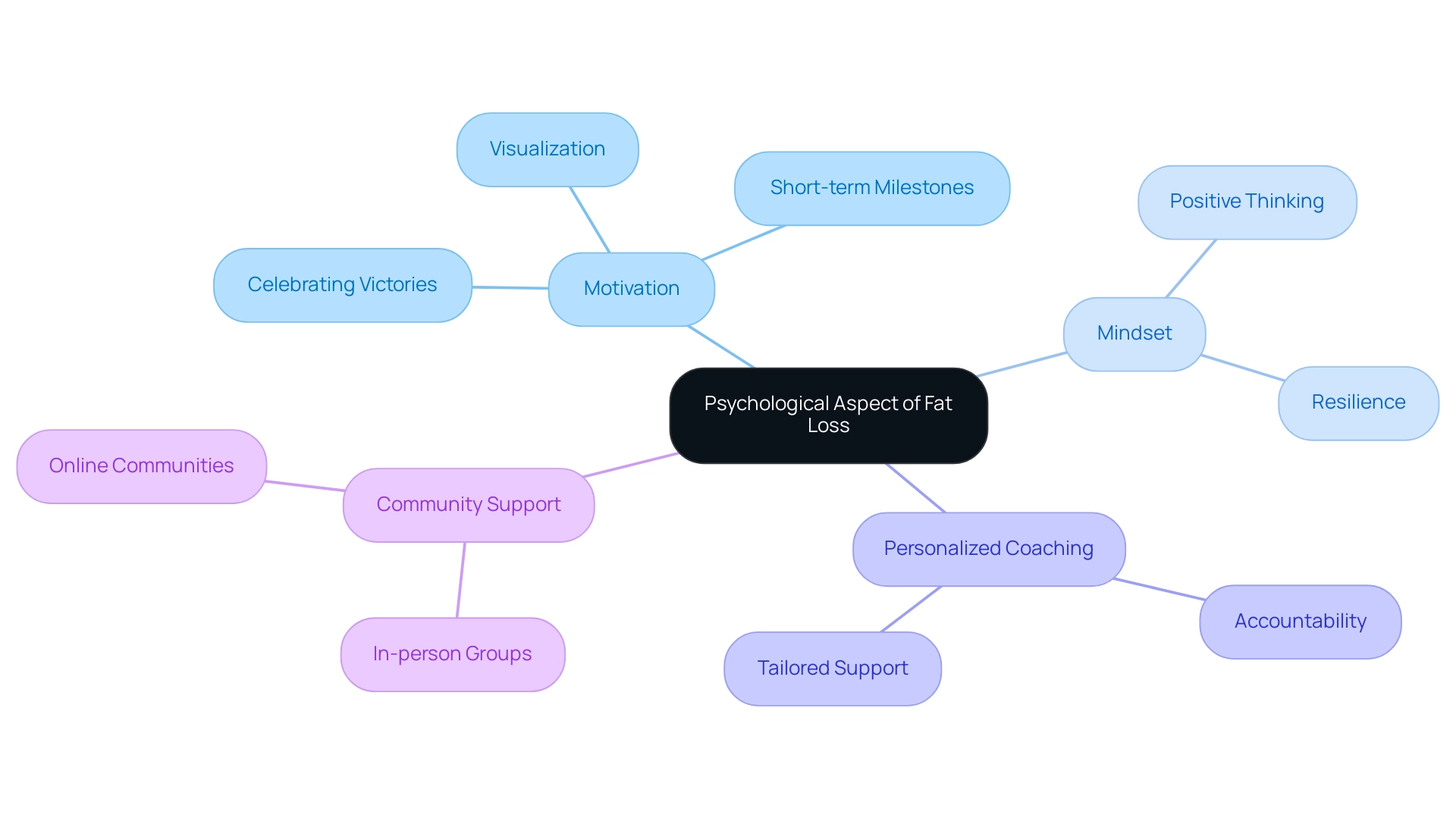
Conclusion
Embracing a holistic approach to fat loss is essential for achieving lasting results. The journey to reduce belly fat involves more than just performing sit-ups; it requires a combination of cardiovascular workouts, strength training, and a balanced diet. By understanding the myth of spot reduction and focusing on a diversified fitness regime, individuals can create a sustainable path toward their health goals. The integration of personalized coaching and community support further enhances motivation and accountability, making it easier to stay on track.
Consistency plays a pivotal role in this process. Establishing achievable goals and maintaining a routine are crucial for long-term success. With the right tools and resources, individuals can cultivate habits that not only contribute to fat loss but also promote overall well-being. The psychological aspects of motivation and mindset cannot be overlooked, as they significantly influence one's ability to navigate challenges and stay committed to their health journey.
HR Benefits Managers have a unique opportunity to foster a culture of well-being within their teams by promoting these strategies. By encouraging an environment that values holistic health, personalized support, and consistent effort, organizations can inspire employees to prioritize their well-being. Together, these elements create a powerful framework for lasting change, empowering individuals to achieve their fitness goals and enhance their quality of life. The time to take action is now—commit to a comprehensive approach and watch as your team thrives on the path to better health.
Frequently Asked Questions
Are sit-ups effective for losing belly fat?
No, sit-ups are not effective for losing belly fat. While they strengthen abdominal muscles, research shows that fat reduction occurs throughout the body due to a caloric deficit rather than from targeted exercises like sit-ups.
What is the best approach to reduce belly fat?
A comprehensive approach that includes both cardiovascular activities and strength training is recommended for reducing belly fat. This should be combined with proper nutrition to achieve effective results.
What types of exercises are recommended for burning calories?
Aerobic exercises such as running, cycling, or swimming are recommended for burning calories and supporting weight reduction.
How much exercise is necessary for effective weight reduction?
Studies suggest that relying solely on exercise may require up to 60 minutes of daily exercise to see significant weight reduction.
What role does nutrition play in losing belly fat?
Nutrition is crucial for creating a caloric deficit necessary for fat loss. A balanced diet rich in whole foods, lean proteins, healthy fats, and a variety of fruits and vegetables is essential.
What dietary changes can support weight management?
Minimizing sugar intake and processed foods can significantly enhance efforts in weight management.
What additional strategies can aid in belly fat reduction?
Incorporating resistance training to preserve muscle and high-intensity interval training (HIIT) for efficient workouts can further aid in belly fat reduction.
How can Foresight Health Coaching support individuals in their fitness journey?
Foresight Health Coaching offers tailored programs that include personalized workout plans, nutrition guidance, daily programming, and features like video demonstrations and community support to help users achieve their health goals.

